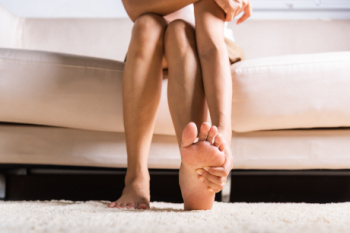

Skateboarding is an exhilarating activity that combines skill, balance, and adrenaline. However, it also comes with its fair share of risks, including the potential for ankle injuries. Ankle sprains occur when the ligaments supporting the ankle joint are overstretched or torn, often due to sudden twists or impacts. In skateboarding, these injuries commonly occur when riders land awkwardly after performing tricks or navigating uneven terrain. Factors such as inadequate footwear, lack of protective gear, and insufficient warm-up routines can further increase the risk of ankle sprains. While ankle sprains are typically mild to moderate injuries, they can still cause pain, swelling, and limited mobility, potentially sidelining skaters for weeks or even months. Proper prevention and management strategies, including supportive footwear, using ankle braces or tape, and practicing proper technique, are essential for reducing the risk of ankle sprains while enjoying the thrills of skateboarding. If you have endured an ankle sprain, it is suggested that you contact a podiatrist who can offer both a treatment plan and additional prevention strategies.
Sports related foot and ankle injuries require proper treatment before players can go back to their regular routines. For more information, contact Dr. Harris L. Klear of Burlington County Podiatry Associates. Our doctor can provide the care you need to keep you pain-free and on your feet.
Sports Related Foot and Ankle Injuries
Foot and ankle injuries are a common occurrence when it comes to athletes of any sport. While many athletes dismiss the initial aches and pains, the truth is that ignoring potential foot and ankle injuries can lead to serious problems. As athletes continue to place pressure and strain the area further, a mild injury can turn into something as serious as a rupture and may lead to a permanent disability. There are many factors that contribute to sports related foot and ankle injuries, which include failure to warm up properly, not providing support or wearing bad footwear. Common injuries and conditions athletes face, including:
Sports related injuries are commonly treated using the RICE method. This includes rest, applying ice to the injured area, compression and elevating the ankle. More serious sprains and injuries may require surgery, which could include arthroscopic and reconstructive surgery. Rehabilitation and therapy may also be required in order to get any recovering athlete to become fully functional again. Any unusual aches and pains an athlete sustains must be evaluated by a licensed, reputable medical professional.
If you have any questions please feel free to contact one of our offices located in Marlton and Delran, NJ . We offer the newest diagnostic and treatment technologies for all your foot and ankle needs.

There are a host of systemic diseases that can contribute to various foot problems, affecting mobility and quality of life. Sciatica, caused by compression of the sciatic nerve, can lead to radiating pain, numbness, and tingling sensations in the feet. Hypothyroidism, characterized by low thyroid hormone levels, may result in cold feet, swelling, and thickened skin. Embolic arterial occlusion, a sudden blockage of an artery by a traveling clot, can cause acute pain, discoloration, and decreased sensation in the feet. Treatment for these conditions varies, depending on the underlying cause and severity. Sciatica may require pain management or surgery in severe cases. Hypothyroidism typically involves hormone replacement therapy and lifestyle modifications. Treatment for embolic arterial occlusion can include blood thinners, thrombolytic therapy, or surgical intervention. If you are experiencing foot problems associated with a systemic disease, it is suggested that you schedule an appointment with a podiatrist for personalized care and treatment to improve foot function.
When dealing with systemic disease of the feet, it is extremely important to check the affected areas routinely so that any additional problems are caught quickly. If you have any concerns about your feet and ankles contact Dr. Harris L. Klear from Burlington County Podiatry Associates. Our doctor will assist you with all of your podiatric needs.
Systemic Diseases of the Feet
Systemic diseases affect the whole body, and symptoms usually are displayed in the feet. This condition can make a patient’s ability to walk unbearable. Systemic diseases include gout, diabetes mellitus, neurological disorders, and arthritis.
Gout – is caused by an excess of uric acid in the body. Common symptoms include pain, inflammation, and redness at the metatarsal/phalangeal joint of the base big toe. Gout can be treated by NSAIDs to relieve pain and inflammation, and other drugs that lower the acid levels in the body.
Diabetes mellitus – is an increase in the level of blood sugar that the body cannot counteract with its own insulin. Failure to produce enough insulin is a factor in Diabetes.
Diabetes of the Feet
Diabetic Neuropathy – may lead to damaged nerves and affect the feet through numbness and loss of sensation.
Peripheral Vascular Disease – can restrict the blood flow to the feet, and often times lead to amputation of the feet.
If you have any questions please feel free to contact one of our offices located in Marlton and Delran, NJ . We offer the newest diagnostic and treatment technologies for all your foot and ankle needs.

As we age, the risk of experiencing a fall increases, posing a significant threat to independence and mobility among individuals aged 65 and older. Falls can lead to severe consequences, often affecting the feet, including fractures, reduced quality of life, and loss of independence. Therefore, prioritizing falls prevention is paramount. Several risk factors contribute to falls in older adults, including muscle weakness, balance issues, medication side effects, and environmental hazards. Implementing preventive measures, such as regular exercise to improve strength and balance, removing tripping hazards at home, ensuring proper lighting, and reviewing medications with a healthcare provider, can significantly reduce the risk of falls. A podiatrist can assess foot health and address issues, such as wearing improper footwear and having foot pain, which can contribute to instability. Additionally, they can provide guidance on proper foot care and recommend custom orthotic devices to improve balance and mobility. If you are a senior and want to learn more about falls prevention and what you can do to protect yourself, it is suggested that you schedule an appointment with a podiatrist who can help you safeguard your independence and well-being.
Preventing falls among the elderly is very important. If you are older and have fallen or fear that you are prone to falling, consult with Dr. Harris L. Klear from Burlington County Podiatry Associates. Our doctor will assess your condition and provide you with quality advice and care.
Every 11 seconds, an elderly American is being treated in an emergency room for a fall related injury. Falls are the leading cause of head and hip injuries for those 65 and older. Due to decreases in strength, balance, senses, and lack of awareness, elderly persons are very susceptible to falling. Thankfully, there are a number of things older persons can do to prevent falls.
How to Prevent Falls
Some effective methods that older persons can do to prevent falls include:
Falling can be a traumatic and embarrassing experience for elderly persons; this can make them less willing to leave the house, and less willing to talk to someone about their fears of falling. Doing such things, however, will increase the likelihood of tripping or losing one’s balance. Knowing the causes of falling and how to prevent them is the best way to mitigate the risk of serious injury.
If you have any questions, please feel free to contact one of our offices located in Marlton and Delran, NJ . We offer the newest diagnostic and treatment technologies for all your foot care needs.

Lisfranc fractures or injuries, although rare, can be incredibly painful and often require prompt diagnosis and treatment. These injuries affect the joints in the middle of the foot, and while Lisfranc fractures can sometimes be mistaken for a sprain, they necessitate specialized care from a podiatrist. Causes include sports-related trauma, and everyday accidents like falling down stairs or having an object land on the foot. Among the symptoms are tenderness, swelling, bruising, and severe pain while standing or walking. Diagnosis typically involves a physical examination and X-rays, with further imaging like CT scans or MRIs sometimes necessary for surgical planning. In some cases, conservative treatment methods like immobilization with a cast or boot may suffice. In more severe cases, surgery may be prescribed, particularly if there are fractures, dislocations, or extensive soft tissue damage. If you are experiencing symptoms of a Lisfranc injury or have recently sustained an injury to your foot, it is suggested that you schedule an appointment with a podiatrist for an exam and treatment options.
A broken foot requires immediate medical attention and treatment. If you need your feet checked, contact Dr. Harris L. Klear from Burlington County Podiatry Associates. Our doctor can provide the care you need to keep you pain-free and on your feet.
Broken Foot Causes, Symptoms, and Treatment
A broken foot is caused by one of the bones in the foot typically breaking when bended, crushed, or stretched beyond its natural capabilities. Usually the location of the fracture indicates how the break occurred, whether it was through an object, fall, or any other type of injury.
Common Symptoms of Broken Feet:
Those that suspect they have a broken foot shoot seek urgent medical attention where a medical professional could diagnose the severity.
Treatment for broken bones varies depending on the cause, severity and location. Some will require the use of splints, casts or crutches while others could even involve surgery to repair the broken bones. Personal care includes the use of ice and keeping the foot stabilized and elevated.
If you have any questions please feel free to contact one of our offices located in Marlton and Delran, NJ . We offer the newest diagnostic and treatment technologies for all your foot and ankle needs.